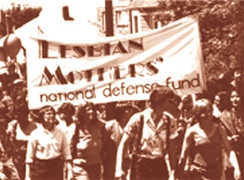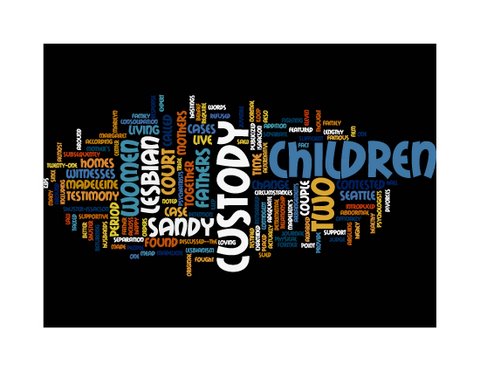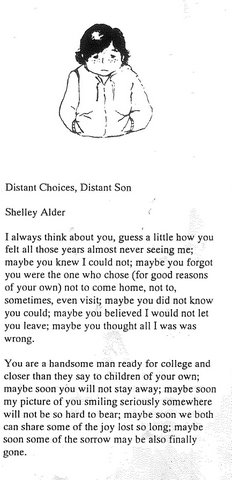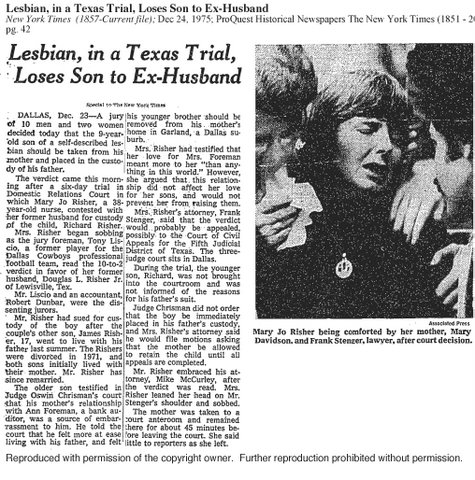Difference between revisions of "Seattle, WA: The Lesbian Mother's National Defense Fund, the 1970's through the 1990's"
| Line 2: | Line 2: | ||
-------''Motto of the Lesbian Mother’s National Defense Fund'' | -------''Motto of the Lesbian Mother’s National Defense Fund'' | ||
| − | The Lesbian Mothers National Defense Fund (LMNDF) was started by a group of young lesbians in Seattle WA in 1974. Starting with a small group of women and an even smaller amount of money, the LMNDF held fund raisers, raised awareness, collected resources and supported | + | The Lesbian Mothers National Defense Fund (LMNDF) was started by a group of young lesbians in Seattle WA in 1974 in order to provide support to lesbians across the United States who were leaving heterosexual marriages and fighting for custody of their children. Starting with a small group of women and an even smaller amount of money, the LMNDF held fund raisers, raised awareness, collected resources, educated lawyers, paid for court costs and generally supported lesbian mothers. |
| Line 28: | Line 28: | ||
== Unfit Mothers: Lesbian Mothers Fight for Custody == | == Unfit Mothers: Lesbian Mothers Fight for Custody == | ||
| − | One of the "most famous" cases of lesbian custody was fought by two Seattle women, Sandy and Madeliene in the early 1970's. <ref name=Rivera> Rivera, Rhonda R. "Our Straight-Laced Judges: The Legal Position of Homosexual Persons in the United States" in Hastings Law Journal 799 1978-1979,799-955 </ref> This was officially called the Shuster-Issacson case, which was the consolidation of two custody cases in which the fathers and former husbands of the lesbian couple sued Sandy Shuster and Madeliene Isaacson for custody of their children. | + | Two well-known cases of lesbians fighting for custody were fought in Seattle, around the time that LMNDF was founded. One of the "most famous" cases of lesbian custody was fought by two Seattle women, Sandy and Madeliene in the early 1970's. <ref name=Rivera> Rivera, Rhonda R. "Our Straight-Laced Judges: The Legal Position of Homosexual Persons in the United States" in Hastings Law Journal 799 1978-1979,799-955 </ref> This was officially called the Shuster-Issacson case, which was the consolidation of two custody cases in which the fathers and former husbands of the lesbian couple sued Sandy Shuster and Madeliene Isaacson for custody of their children. |
According to the Hastings Law Journal, during the original contested divorces-- in which their lesbianism was discussed--the women were awarded custody of their children contingent upon the physical separation of the two women and their children.<ref name=Rivera/>; in other words, they could keep their kids but not live together as a family. In response, Sandy and Madeleine found separate homes across the hall from each other. The two fathers subsequently contested custody, arguing that since they had remarried they could provide adequate homes, that the two women were in fact living together against court orders and that they had publicized their relationship. <ref name=Rivera/> | According to the Hastings Law Journal, during the original contested divorces-- in which their lesbianism was discussed--the women were awarded custody of their children contingent upon the physical separation of the two women and their children.<ref name=Rivera/>; in other words, they could keep their kids but not live together as a family. In response, Sandy and Madeleine found separate homes across the hall from each other. The two fathers subsequently contested custody, arguing that since they had remarried they could provide adequate homes, that the two women were in fact living together against court orders and that they had publicized their relationship. <ref name=Rivera/> | ||
| Line 64: | Line 64: | ||
"Mom's Apple Pie" was also full of cheerful images of lesbian mothers, like this one from the Fall 1990 issue. | "Mom's Apple Pie" was also full of cheerful images of lesbian mothers, like this one from the Fall 1990 issue. | ||
[[Image:LMRN_Fall_1990_Page_4_image.jpg]] | [[Image:LMRN_Fall_1990_Page_4_image.jpg]] | ||
| + | |||
| + | |||
| + | == Lesbian Mothers in the News == | ||
| + | |||
| + | Lesbian custody cases were national stories, and made newspaper headlines throughout the life of the LMNDF. The following news articles represent just a few of the cases featured in major newspapers. | ||
| + | |||
| + | [[Image:Texas_LEsbian_Loses_Custody_Mary_Jo.jpg]] | ||
| + | |||
| + | |||
<references/> | <references/> | ||
Subject Categories: Lesbian, mother, custody movement, mom's apple pie, LMNDF, Seattle | Subject Categories: Lesbian, mother, custody movement, mom's apple pie, LMNDF, Seattle | ||
Revision as of 00:21, 1 April 2010
'“Raising our Children is a Right, Not a Heterosexual Privilege”'
Motto of the Lesbian Mother’s National Defense Fund
The Lesbian Mothers National Defense Fund (LMNDF) was started by a group of young lesbians in Seattle WA in 1974 in order to provide support to lesbians across the United States who were leaving heterosexual marriages and fighting for custody of their children. Starting with a small group of women and an even smaller amount of money, the LMNDF held fund raisers, raised awareness, collected resources, educated lawyers, paid for court costs and generally supported lesbian mothers.
The Lesbian Mother's National Defense Fund (LMNDF)
The LMNDF was featured in the 2006 documentary film, Mom's Apple Pie: The Heart of the Lesbian Mothers National Defense Fund. The following information is quoted from this film.
<youtube>25_JMHsqbmg&hl</youtube>
"The Lesbian Mother's National Defense Fund was an organization formed to support women who were going through divorce and custody cases so that they could retain custody, or at least visitation, with their children." Lois Thetford. [1]
“There wasn’t a single case in the United States in 1972 in which a lesbian mother had won, not only won custody that hadn’t happened, but even won normal visitation rights.” Barbara ‘Boo’ Price [1]
“The overwhelming legal standard is always best interest of the child so that leaves a lot of discretion to the court judge.” Jean Rietchel [1]
One of the impacted children, Melissa Hart, spoke about her experience in the film: "I think divorce is devastating to young children in general, but to be taken away from an absolutely wonderful mother, I mean this was our girl scout leader . . . to be taken away from her because she was sleeping with a woman and dropped into our father's extremely abusive and volatile household, it was devastating. [1]
“We have managed to find 10 cases that have been won in court by open lesbians. That is 10 cases, total, ever, in the United States and Canada that there are records on.” A February 1976 LMNDF newsletter, "Mom's Apple Pie," as quoted in the film. [1]
According to the documentary film, "Between 1974 and 1980 the Seattle-based Lesbian Mothers’ National Defense Fund provided assistance to over 400 lesbian mothers.” [1]
Unfit Mothers: Lesbian Mothers Fight for Custody
Two well-known cases of lesbians fighting for custody were fought in Seattle, around the time that LMNDF was founded. One of the "most famous" cases of lesbian custody was fought by two Seattle women, Sandy and Madeliene in the early 1970's. [2] This was officially called the Shuster-Issacson case, which was the consolidation of two custody cases in which the fathers and former husbands of the lesbian couple sued Sandy Shuster and Madeliene Isaacson for custody of their children.
According to the Hastings Law Journal, during the original contested divorces-- in which their lesbianism was discussed--the women were awarded custody of their children contingent upon the physical separation of the two women and their children.[2]; in other words, they could keep their kids but not live together as a family. In response, Sandy and Madeleine found separate homes across the hall from each other. The two fathers subsequently contested custody, arguing that since they had remarried they could provide adequate homes, that the two women were in fact living together against court orders and that they had publicized their relationship. [2]
In support of the lesbian mothers' case, a film was made called Sandy and Madeliene's Family, which featured supportive testimony from Margaret Mead. [3] In addition, many expert witnesses testified on their behalf. "After a lengthy trial in which twenty-one witnesses were introduced, including eleven psychiatrists and psychologists, the court found that the change in circumstances was not sufficient to require a change in custody from the mothers to the fathers. The court noted that 'almost all of the testimony of all the people who actually saw, examined, or talked to the children was that the children are healthy, happy, normal, loving children.'". [2]
Around the same time period, Marilyn Koop was not so lucky, when a judge in the same county removed custody of two of her three children. [2] Her children were at one point placed in a juvenile detention center when they refused to live with their father by a judge who thought this a better alternative than returning them to their mother’s “abnormal” and “highly detrimental” living arrangements (as a lesbian couple). [3]
Mom's Apple Pie: The Newsletter of the LMNDF
For over two decades, the Lesbian Mother's National Defense Fund (LMNDF) produced and distributed a newsletter titled "Mom's Apple Pie." The newsletter included letters and pleas from women needing financial support for their current custody battles, drawings, reflections and poetry from lesbian mothers, news updates on relevant court cases and legal changes across the nation, and much more. Following are excerpts, scanned from the original newsletters which were obtained from library archives. As more newsletters become available for scanning, the material included will be updated to more evenly represent the time span of the LMNDF's activities. Around 1990, the LMNDF changed names to become the Lesbian Mother's Resource Network, as can be seen in the following excerpts.
This essay, published in the Winter 1990 newsletter, was written by a woman struggling to keep custody of her children while openly identifying as a lesbian.
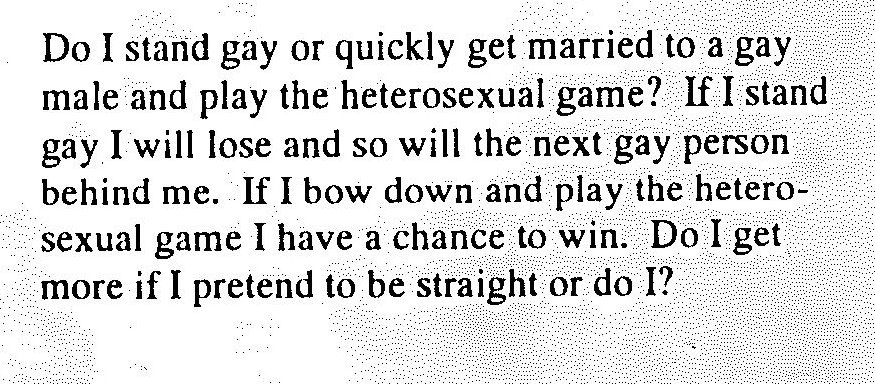
Also from the Winter 1990 newsletter, this reflection is shared by a lesbian mother who wasn't allowed to raise her son.
Lesbian mothers in the midst of custody battles often felt isolated and alone. The LMNDF provided lesbians with critical support in difficult times. One way they did this was by collecting and sharing local resources for lesbian mothers. This list of resources was published in the Fall 1990 newsletter.
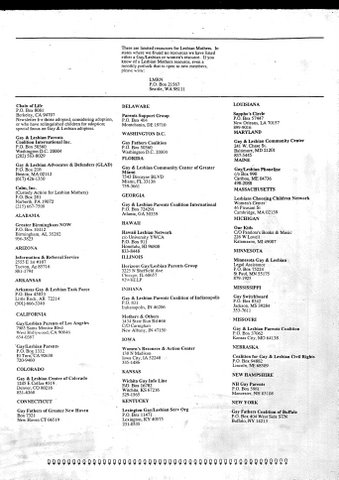
Building the list of resources was a collaborative effort, as can be seen by this plea for contributions that accompanied the publication of the list.
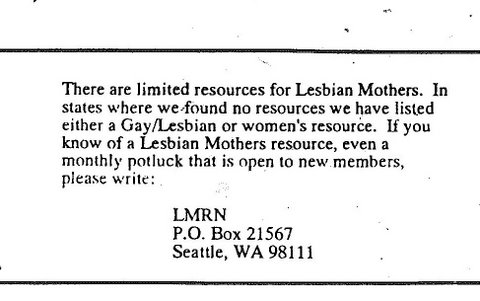
"Mom's Apple Pie" was also full of cheerful images of lesbian mothers, like this one from the Fall 1990 issue.
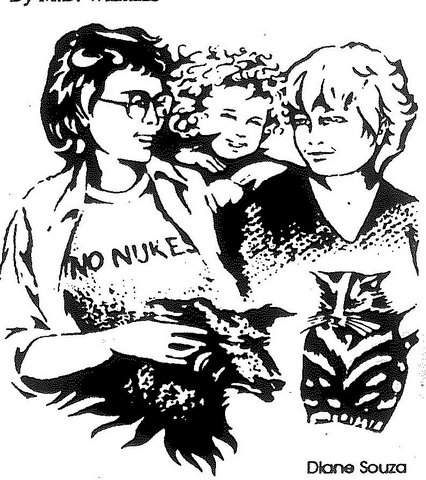
Lesbian Mothers in the News
Lesbian custody cases were national stories, and made newspaper headlines throughout the life of the LMNDF. The following news articles represent just a few of the cases featured in major newspapers.
- ↑ 1.0 1.1 1.2 1.3 1.4 1.5 Mom's Apple Pie: The Heart of the Lesbian Mother's Custody Movement, Directed by Jody Laine, Shan Ottey and Shad Reinstein. Frameline Media, San Francisco CA, 2006.
- ↑ 2.0 2.1 2.2 2.3 2.4 Rivera, Rhonda R. "Our Straight-Laced Judges: The Legal Position of Homosexual Persons in the United States" in Hastings Law Journal 799 1978-1979,799-955
- ↑ 3.0 3.1 Polikoff, Nancy. Beyond (Straight and Gay) Marriage: Valuing All Families Under the Law. Beacon Press: Boston, 2008.
Subject Categories: Lesbian, mother, custody movement, mom's apple pie, LMNDF, Seattle
